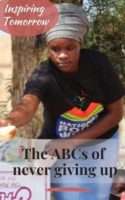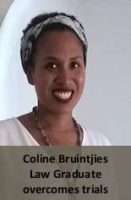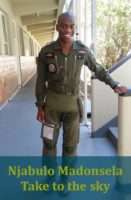South Africa has seen a relative success in achieving democracy; however, legacies of apartheid have made it difficult for many underprivileged young South Africans from rural backgrounds. One of their biggest challenges has been to make it beyond high school level education.
The Rural Education Access Programme (REAP) was initiated in 2001 and aims to tackle such difficulties faced by selected groups of motivated young rural people who face a variety of financial constraints. REAP’s mandate has been to see children from rural communities afforded an opportunity in further education studies at tertiary level.
Today’s story is a driven young person and beneficiary of this amazing initiative, who has made the most of this opportunity! 21-year-old Pretty Mukhare is from Mokopane in Limpopo. She was scouted by REAP during her matric and was later afforded the means to further her medical studies at the Tshwane University of Technology (TUT) in 2013.
Pretty says she first found out about REAP from her high school Life Orientation teacher who, she says, motivated her to apply for REAP’s assistance after recognising “a lot of potential” in her.
“I never thought I would go to university after matric because I knew my mother’s financial position,” says Pretty.
“I was introduced to REAP by my high school L.O. teacher who motivated me to apply to be a part of the programme.” Before that, Pretty says she had only been dreaming about furthering her studies but never actually thought it would become a reality.
“Having seen the common paths taken by most of the young people around my poor community after they matriculated, I did not imagine a different future for myself,” she says.
After losing her father when she was only nine years old in 2003, she was raised by a striving single mother who she says has been her rock throughout her student years.
“She always made sure I was clothed, fed and that I went to school despite her financial challenges.”
In boarding school, Pretty says she rarely got visits from her mother, unlike other children who often would, this because of the distance and money involved in the travelling.
“Even when I was in boarding school during high school, I would only occasionally get visits from my mother because my school was in Polokwane which is three taxis away from home, and so expensive”.
Coming from such a background, it was the understanding of poverty that, Pretty says, has always motivated her to work hard in school.
“I have always had a dream to one day afford a better life for my family and I understand that education creates such possibilities.”
“Opportunities like the one I received are very rare, especially in rural areas where so few people think to look, I am grateful for it and only wish for those like myself to receive the same,” she says.
Earlier this year, Pretty graduated from the Tshwane University of Technology (TUT) where she excellently finished off her further education medical studies!
“My family is poor and I always knew that I was not like other kids because my mother would often tell me about her financial difficulties.” Although Pretty says her current struggle is finding relevant work because “the job market is another struggle”, she remains motivated and hopeful.
Pretty acknowledges that hope is very important and that without it there is no will! “There are many underprivileged people who lose hope because of difficult circumstances and no one may seem to understand, but young people should keep it alive and look for opportunities.”
“My mother always told me that if I worked hard, I could become anything I want to be,” she says, thanking REAP for offering her the steps towards that direction.
REAP has helped a number of young people from all over the country obtain a tertiary level certification. It first operated as Catholic Education Assistance Programme (CEAP) as an associate of the body of the Southern African Catholic Bishops’ Conference (SACBC). REAP today offers assistance to rural young people ‘regardless of faith or affiliation’.
REAP is a registered nationwide non-profit organisation which operates with a level 3 BEE status with offices in Cape Town, Johannesburg and Durban. It is pioneered by a team of 28 staff members and a wide volunteer network and NGO Partners in the country.
“Our students originate from rural schools in all 9 provinces and are enrolled in a wide range of courses at 16 different Higher Education Institutions,” reads their website.





